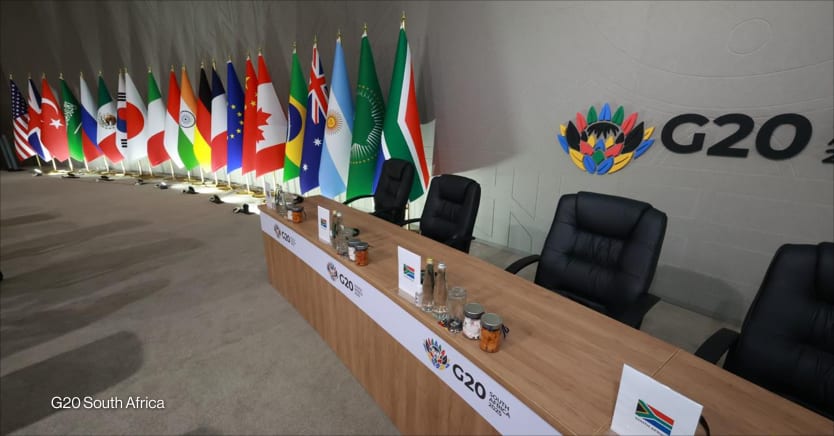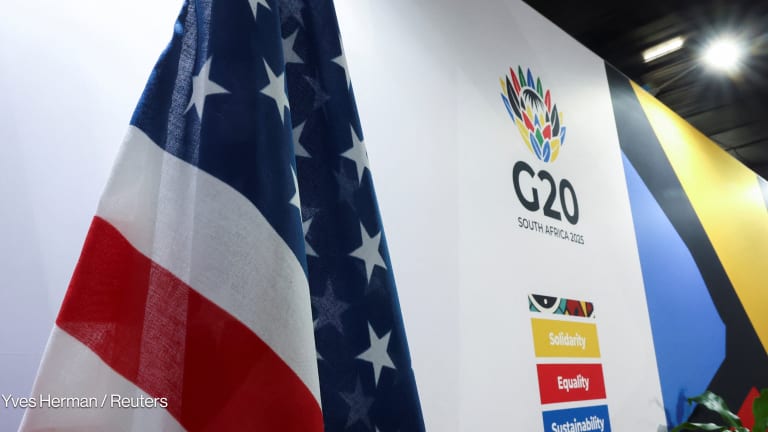Presented by United Cities and Local Governments

From the first day of his country’s Group of 20 presidency, Cyril Ramaphosa — the president of South Africa — was clear. This G20 would be for Africa.
“South Africa has used this presidency to place the priorities of Africa and the Global South firmly at the heart of the G20 agenda,” said Ramaphosa, speaking to world leaders one year after he was handed the position from last year’s president, Brazil. “The G20 South Africa Summit Leaders’ Declaration is more than words — it is a commitment to concrete actions that will improve the lives of people in every part of the world.”
But for weeks, it wasn’t clear if the G20, which is made up of leaders from the world’s largest economies, would come to an agreement at all.
Faith in multilateralism was buckling, and day after day, geopolitical tensions continued to climb. The United States — the largest economy in the world — refused to attend the G20 leaders’ summit at all. President Donald Trump cited discredited claims that white Afrikaner farmers were being murdered on South African soil, and Ramaphosa shot back, saying the United States’ absence was “their loss.”
“The G20 will go on,” said Ramaphosa, speaking just before the summit began. “All other heads of state will be here, and in the end, we will take fundamental decisions.”
Ultimately, that’s exactly what happened. The other 18 countries — plus the African and European unions — issued a consensus declaration on Saturday, with those negotiating the text working through the night to have the document ready by morning. But while the U.S. wasn’t in the room, its influence rippled through the negotiations.
“South Africa led the G20 to get to a Leaders’ Declaration against all odds,” says Nabil Ahmed, Oxfam America’s director of economic and racial justice. “But being here in Joburg, it’s very clear that the ghost of President Trump was haunting rich countries at this summit.”
ICMYI: What are the key issues at stake at the G20 summit in South Africa?
‘Painting over rust’
First, a scene setter: It’s hard to overestimate the G20’s weight on Johannesburg.
Televisions in bars, restaurants, and malls constantly screened summit coverage, and G20 signage was plastered everywhere — including a highway underpass, where portraits of each world leader faced off against the city’s drivers.
But in the weeks leading up to the summit, Johannesburg had been transformed by more than just signs. By Saturday, potholes had been filled, trees had been planted, and street vendors had been shuffled off the streets.
But for most South Africans I spoke with, the facelift was hardly a cure for a city that often felt on the verge of collapse. For years, Johannesburg’s poverty rate has been increasing: By 2021, the government estimated that over half of the city’s population lived under the poverty line. In part, that’s due to the fact that Johannesburg has an unemployment rate above 30%, and the city’s infrastructure — like its water and electricity systems — has been deteriorating for years.
“It feels like they’re painting over rust,” one of my cab drivers tells me. “And they know the rust underneath isn’t going anywhere.”
Almost everyone I met in Johannesburg felt the same. South Africa was pushing for solidarity, equality, and sustainability on the international stage. But how would that ripple down to those in the most unequal country on earth?
Related: Protests push South Africa to name gender violence a national disaster
Priority pushing
The disconnect between the summit’s polish and the city’s struggles underscored the stakes of South Africa’s agenda — and why it pressed so hard to put African priorities first.
“It took a leadership role on the continent to drive African priorities — and that was a heavy agenda,” says Kesaobaka Nancy Mopipi, a G20 researcher at the South African Institute of International Affairs, or SAIIA. “It was certainly not an easy one to push, but I think they really tried to make that work.”
That meant positioning debt relief, inequality, and the just energy transition at the center of its G20 process, and highlighting topics such as climate change, disaster resilience, and the growth of the critical mineral industry across Africa.
Ultimately, the leaders’ declaration did just that — and the results were mixed.
Inequality was elevated at the G20 like never before, and South Africa committed to sustaining a new mechanism, the Africa Engagement Framework, to ensure the continent’s financial issues remained on the G20 agenda for the next five years.
The leaders also called for peace in “Sudan, the Democratic Republic of Congo, the Occupied Palestinian Territory, and Ukraine,” with the order of those conflicts spotlighting two places that are often overshadowed on the global stage.
But even so, key recommendations from a G20-commissioned panel — which had proposed a new debt refinancing initiative for low-income countries — didn’t make it into the declaration, and taxation gains made by Brazil’s G20 presidency, which are often seen as a way for low- and middle-income nations to boost their resources, were largely left off the list.
Gilad Isaacs, the executive director of the South African-based Institute for Economic Justice, tells me the declaration was a “victory for the diplomatic process, but doesn’t really move the needle on policy substance.” Despite that, he says, “some might argue that holding the line in this current geopolitical environment is an achievement in itself.”
Read: G20 summit in South Africa adopts declaration without the US
ICYMI: G20 panel calls for a new debt refinancing plan for low-income nations
See also: Experts press G20 to make debt relief faster and fairer (Pro)
+ Not yet a Devex Pro member? We have a 15-day free trial for you to explore member benefits including deeper funding insights and insider reporting, members-only briefings with sector leaders and policymakers, priority access to in-person development events and summit roundtables — and you’ll help keep essential journalism open for others.
The fine print
Other things moved in the field of global development, too. Here’s a roundup:
⛏️ Throughout the year, South Africa’s G20 presidency pushed for critical mineral exploration across Africa, noting that today, the continent holds 30% of the world’s supply. An agreed-upon (but yet-to-be-released) blueprint recognizes that call, while strategizing how critical minerals can be “a catalyst for development” instead of a “cycle of extraction,” per Ramaphosa.
🌍 Climate is emphasized heavily in the leaders’ declaration, especially when it comes to strengthening disaster resilience and response — a key theme of this year’s G20 process. A set of principles was adopted to help encourage countries to invest in disaster risk reduction, including through the use of insurance and crisis-resilient debt clauses, which let countries pause loan payments after a disaster so they can focus on recovery.
💰The heads of Brazil, South Africa, Spain, and the African and European unions backed a new proposal to create an international panel on inequality, one that would synthesize data on the topic and provide policy analysis to governments.
🛑 European leaders scrambled to support Ukraine after Trump released a 28-point plan to end the war in the country. Their response pushed back against demands that Ukraine reduce its territory and army. “Borders must not be changed by force,” the leaders wrote in a joint statement.
🥦 Earlier this year, the G20’s food security track pushed for recognition of initiatives to reduce food price inflation — including through the use of food buffer stocks, a price-stabilizing tool that governments can lean on when markets swing. The African Union and African Continental Free Trade Area are now looking at what it would take to implement those stocks within the Southern African Development Community bloc.
Some see these gains as modest, but others suggest that South Africa had laid the groundwork for future change.
“Progress is measured in millimeters in these kinds of spaces,” says SAIIA’s Mopipi. “The true fruits of South Africa's G20 presidency will only really start coming forth in the coming years, as and when we engage in the initiatives they leave behind.”
Related opinion: Africa can feed the world if the G20 frees it from debt
Hello, old friends
All of that happened alongside something a little more nostalgic. The leaders of India, Brazil, and South Africa met to revive IBSA, a forum that was created to deepen the countries’ cooperation, align on global issues, and support low- and middle-income countries through the associated IBSA Fund.
The last time IBSA leaders met for a stand-alone summit was in 2011. And though ministers from those countries have continued to coordinate, much of the group’s work has been overshadowed by BRICS, a larger bloc of emerging countries that has become a major political force.
On Saturday, the countries’ heads of state tried to breathe life back into IBSA, with all three committing to working toward sustainable development together — including through the IBSA Fund, which has funded 48 projects worth $54.3 million since 2006.
“IBSA can not only complement one another’s development efforts but also serve as an example for the world,” said Indian Prime Minister Narendra Modi, speaking at a meeting between the three leaders on Sunday.
By reaffirming their cooperation, Ramaphosa added, the tripartite could work together “to shape the global agenda” — perhaps at least in part because of what Brazilian President Luiz Inácio Lula da Silva put plainly: Among these three leaders, “there is trust” to openly talk about human rights, gender equity, sexual and reproductive rights, the fight against extremism, and the defense of democracy.
“We share many causes and have much to say to the world,” Lula wrote in Portuguese on the social media platform X, formerly Twitter. “Today's meeting is a central step to revive our trilateral coordination.”
A shifting world order
With the U.S. absent from the summit and IBSA leaders renewing their partnership, Johannesburg offered a glimpse of how the global south is navigating an increasingly fractured world.
Countries such as South Africa, India, and Brazil weren’t waiting for the traditional powers to lead. Instead, they were aligning with one another — not to replace the old order, but to gain more leverage within it.
“South Africa led the G20 to get to a leaders declaration, where coming into this a week ago, there were question marks on if that would even happen,” adds Oxfam’s Ahmed. “I think that's a victory for multilateralism, and it showed you can stand firm against geopolitical bullying.”
Still, that doesn’t mean coming to a consensus at the G20 was easy. There was palpable pushback from some of the world’s wealthiest countries on issues such as progressive taxation and gender, which Oxfam’s Ahmed explains led to a leaders’ declaration that was “watered down by rich countries afraid of the United States.”
There were also many more heads of state missing in Johannesburg than just Trump: China’s Xi Jinping, Russia’s Vladimir Putin, Argentina’s Javier Milei, and Mexico’s Claudia Sheinbaum all skipped the summit, though each of those leaders sent senior officials in their place.
“You can see that the world is currently undergoing a realignment and new connections are being formed here,” German Chancellor Friedrich Merz told reporters on Sunday.
More on our coverage of the G20 summit:
• South Africa wins credit rating boost after two decades.
• G20 reporter's notebook: Social Summit Day 3.
•G20 recommits to debt relief — but critics say it’s far from enough.
•What does the United States’ G20 presidency mean for the world?
Sign up to Newswire for an inside look at the biggest stories in global development.
Search for articles
Most Read
- 1
- 2
- 3
- 4
- 5








